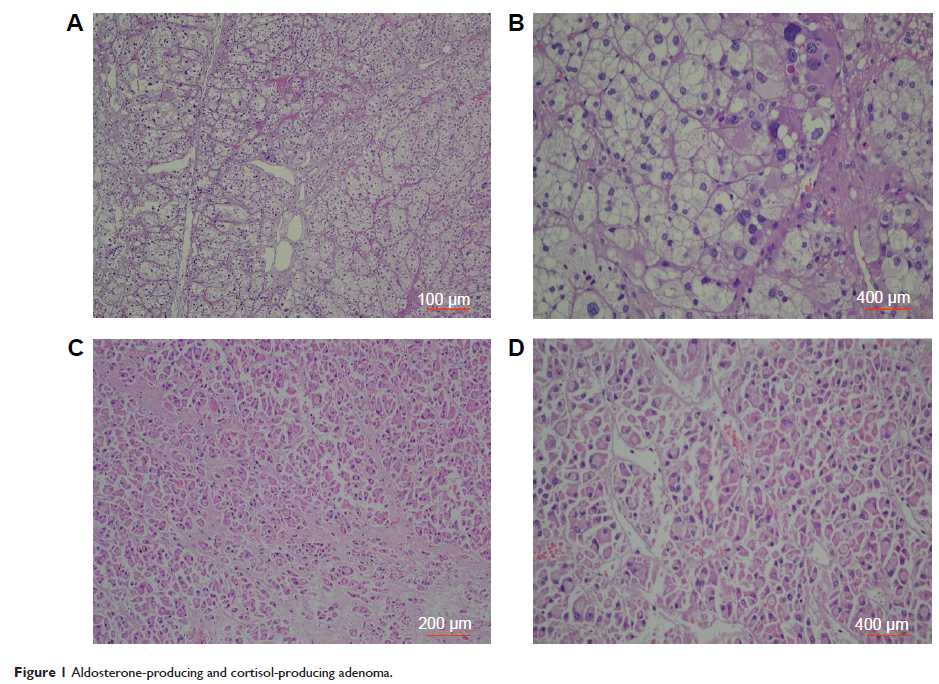109669
论文已发表
注册即可获取德孚的最新动态
IF 收录期刊
- 3.4 Breast Cancer (Dove Med Press)
- 3.2 Clin Epidemiol
- 2.6 Cancer Manag Res
- 2.9 Infect Drug Resist
- 3.7 Clin Interv Aging
- 5.1 Drug Des Dev Ther
- 3.1 Int J Chronic Obstr
- 6.6 Int J Nanomed
- 2.6 Int J Women's Health
- 2.9 Neuropsych Dis Treat
- 2.8 OncoTargets Ther
- 2.0 Patient Prefer Adher
- 2.2 Ther Clin Risk Manag
- 2.5 J Pain Res
- 3.0 Diabet Metab Synd Ob
- 3.2 Psychol Res Behav Ma
- 3.4 Nat Sci Sleep
- 1.8 Pharmgenomics Pers Med
- 2.0 Risk Manag Healthc Policy
- 4.1 J Inflamm Res
- 2.0 Int J Gen Med
- 3.4 J Hepatocell Carcinoma
- 3.0 J Asthma Allergy
- 2.2 Clin Cosmet Investig Dermatol
- 2.4 J Multidiscip Healthc

116 例成人肾上腺皮质腺瘤的临床和病理分析和文献综述
Authors Jia AH, Du HQ, Fan MH, Li YH, Xu JL, Niu GF, Bai J, Zhang GZ, Ren YB
Published Date May 2015 Volume 2015:8 Pages 1251—1257
DOI http://dx.doi.org/10.2147/OTT.S81831
Received 29 January 2015, Accepted 13 February 2015, Published 28 May 2015
Background: The aim of
this study is to investigate origin, gross features, microscopic features,
immunohistochemical properties, and differential diagnosis of adrenal cortical
adenoma (ACA) in patients ≥20 years old.
Methods: The
clinicopathological features of 116 cases of ACA and the immunohistochemical
features of 50 cases of ACA were evaluated, and the relevant literature was
reviewed.
Results: In our cohort, 76.72%
(89/116) of the cases were functional, and 27 cases had non-functional, benign
adrenal adenomas. ACA presented as an island tumor with an envelope, and the
mean tumor size was 3.6 cm (range 1–5 cm), with a mean tumor weight of 9.28 g
(range 5–113 g). The shape of the tumor cells was consistent, and mitosis was
rarely observed. Forty of the 46 patients with cortisol-secreting ACA had
tumors containing granule cells. Primary aldosteronism was observed in 43
cases. Thirty-eight cases had endoscopically visible tumors, with clear cells
and lipid-rich cytoplasm arranged in irregular patches or strips.
Cortisol-producing ACAs were associated with atrophy of the non-tumorous
cortex. Adrenocortical adenomas displayed positive immunohistochemical staining
for MELAN-A, Syn (46 of 50 cases of ACA), NSE (44 of 50 cases of ACA), Vim (42
of 50 cases of ACA) and Ki-67 <5% (24 of 50 cases of ACA; the remaining 26
cases were negative for Ki-67).
Conclusion: Prediction of
endocrine syndrome in functional ACA was possible based on its structure and
morphologic features, which could prevent an unanticipated postoperative
crisis. However, a clinical study is needed to validate these findings.
Keywords: adrenal cortical
adenoma, pathological features, immunohistochemical staining, pathological
analysis
